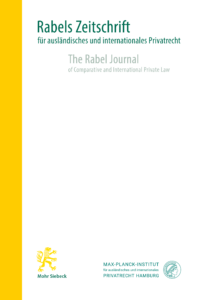Views
UK Supreme Court in Jalla v Shell: the claim in Bonga spill is time barred
The UK Supreme Court ruled that the cause of action in the aftermath of the 2011 Bonga offshore oil spill accrued at the moment when the oil reached the shore. This was a one-off event and not a continuing nuisance. The Nigerian landowners’ claim against Shell was thus barred by the limitation periods under applicable Nigerian law (Jalla and another v Shell International Trading and Shipping Company and another [2023] UKSC 16, on appeal from [2021] EWCA Civ 63).
On 10 May 2023, the UK Supreme Court has ruled in one of the cases in the series of legal battles started against Shell in the English courts in the aftermath of the Bonga spill. The relevant facts are summarized by the UK Supreme Court as follows at [6] and [7]:
Data on Choice-of-Court Clause Enforcement in US
The United States legal system is immensely complex. There are state courts and federal courts, state statutes and federal statutes, state common law and federal common law. When I imagine a foreign lawyer trying to explain this system to a foreign client, my heart fills with pity.
This feeling of pity is compounded when I imagine this same lawyer trying to advise her client as to whether a choice-of-court clause will be enforced by a court in the United States. The law on this subject is complicated. It is, moreover, not easy to determine how it is applied in practice. Are there differences in clause enforcement rates across the states? Across federal circuits? Do state courts enforce these clauses at the same rate as federal courts? Until recently, there was no data that would allow a foreign lawyer – or a U.S. lawyer, for that matter – to answer any of these questions.
Over the past several years, I have authored or co-authored several empirical articles that seek to answer the questions posed above. This post provides a summary of the data gathered for these articles. All of the cases referenced involve outbound choice-of-court clauses, i.e. clauses that select a jurisdiction other than the one where the suit was filed. Readers interested in the data collection process, the caveats to which the data is subject, or other methodological issues should consult the articles and their appendices. This post first describes state court practice. It then describes federal court practice. It concludes with a brief discussion comparing the two.
Polish Constitutional Court about to review the constitutionality of the jurisdictional immunity of a foreign State?
Written by Zuzanna Nowicka, lawyer at the Helsinki Foundation for Human Rights and lecturer at Department of Logic and Legal Argumentation at University of Warsaw
In the aftermath of the judgment of the ICJ of 2012 in the case of the Jurisdictional Immunities of the State (Germany v. Italy: Greece intervening) that needs no presentation here (for details see, in particular, the post by Burkhard Hess), by its judgment of 2014, the Italian Constitutional Court recognized the duty of Italy to comply with the ICJ judgment of 2012 but subjected that duty to the “fundamental principle of judicial protection of fundamental rights” under Italian constitutional law (for a more detailed account of those developments see this post on EAPIL by Pietro Franzina and further references detailed there). In a nutshell, according to the Italian Constitutional Court, the fundamental human rights cannot be automatically and unconditionally sacrificed in each and every case in order to uphold the jurisdiction immunity of a foreign State allegedly responsible for serious international crimes.
Since then, the Italian courts have reasserted their jurisdiction in such cases, in some even going so far as to decide on the substance and award compensation from Germany. The saga continues, as Germany took Italy to the ICJ again in 2022 (for the status of the case pending before the ICJ see here). It even seems not to end there as it can be provocatively argued that this saga has its spin-off currently taking place before the Polish courts.
News
Happy New Year from ConflictofLaws.net (now also on Bluesky)!
The editors of ConflictofLaws.net would like to wish you a year filled with happiness, health, and success, academically and otherwise.
2024 has been another great year for the blog, with close to one new post per day (bringing us to more than 5,500 posts in total) and record numbers of readers and subscribers. Our content, just like our readership, reflects the global scope of the blog, with popular posts including Saloni Khanderia & Shubh Jaiswal’s article on the application of the lex fori ‘by default’ in Indian courts, Mayela Celis’ note on Smith & Wesson v Mexico, Orji A Uka & Damilola Alabi’s contribution on service under Nigerian law, Yasmín Aguada & Laura Martina Jeifetz two-part piece on international judicial cooperation and technology in private international law, and Tobias Lutzi’s comment on the CJEU’s decision in Real Madrid.
In addition to our e-mail newsletter (which continues to be surprisingly popular), you can subscribe to our blog on LinkedIn, Twitter/X, and – from this year on – Bluesky.
The FAMIMOVE project ends today – A summary of its achievements

Today (31-December 2024), FAMIMOVE 2.0. is coming to an end after having accomplished all of its goals and created a solid network of experts. The project’s full name is Families on the Move: The Coordination between international family law and migration law and is an international project co-funded by the European Commission under the JUST-2022-JCOO program. For more information, click here.
The project aimed to improve the protection of migrant children and families by bringing actual practice more in line with EU goals and values, such as the protection of fundamental rights and best interests of the child. It sought to provide more effectiveness to EU objectives through a better coordination of instruments in overlapping fields, such as Regulations in private international law in family law matters and migration law rules.
Out now: Issue 4/2024 of RabelsZ
 The last issue of RabelsZ 2024 has just been released. It contains the following contributions (which are all available Open Access: CC BY 4.0):
The last issue of RabelsZ 2024 has just been released. It contains the following contributions (which are all available Open Access: CC BY 4.0):
Holger Fleischer & Simon Horn, Unternehmensskandale und skandalgetriebene Regulierung: Die Stavisky-Affäre als Prüfstein (Corporate Scandals and Scandal-Driven Regulation: The Stavisky Affair as Touchstone), pp. 648–693, https://doi.org/10.1628/rabelsz-2024-0062 Read more



